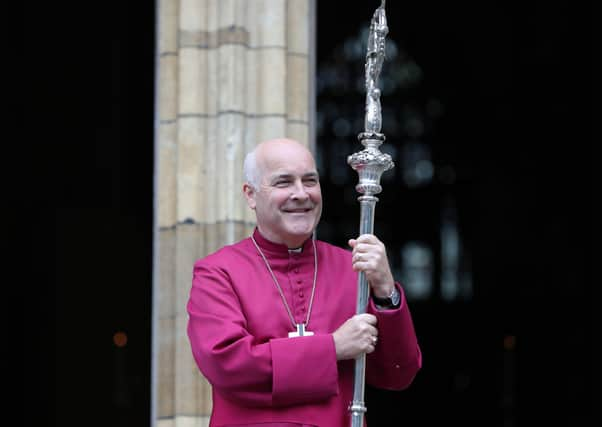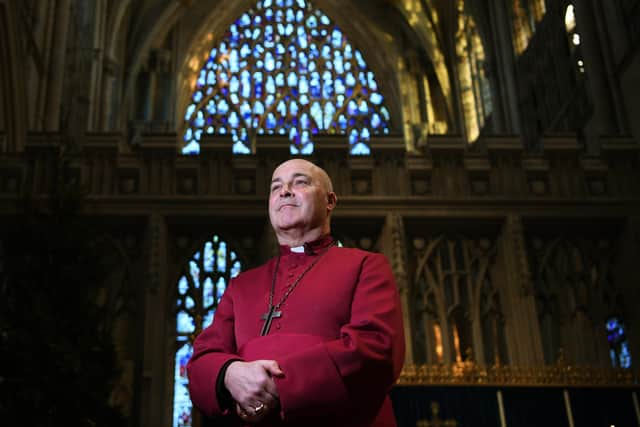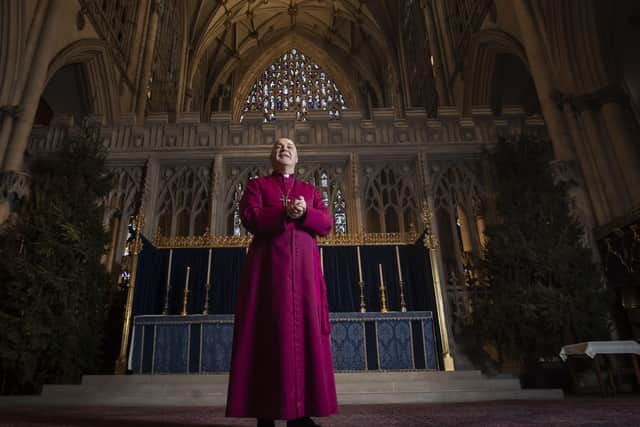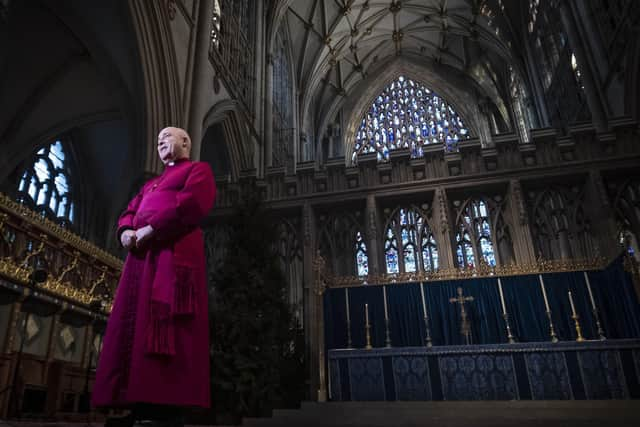Let’s head to a more caring ‘new normal’ - Archbishop of York


I know many commentators have said similar things, but as I begin my ministry as the 98th Archbishop of York and receive the baton from my dear brother Sentamu, and begin to think about the challenges we face, I do believe that despite the horrors and sufferings of the coronavirus pandemic and all the heartache we have experienced, there is an opportunity for us to think deeply about what kind of world we want to be.
And I do mean world: not continent; not nation, not region not even county, but world. Covid-19 is a global pandemic. It spread quickly through a world that moves quickly. It shows us how connected we are. It also shows how the poor and the excluded suffer most.
Advertisement
Hide AdAdvertisement
Hide AdWhen we find a vaccine, or even a cure, then that will, of course, be shared with the world. It will enable us to move on, but with our new sense of inter-connectedness, there is also the opportunity for us to face other ills that have endured for much longer and may actually be even harder to eliminate.


I’m thinking of prejudice and intolerance and the hatred and division it breeds. The Black Lives Matter movement has alerted us to the terrible pandemic of racism. It is a different sort of virus. It attacks the heart, not the lungs. It requires a medicine that we have to find within ourselves and administer to ourselves.
We also have to find the humility of allowing others to show us that we might be ill without fully realising it.
As a Christian, my understanding of our responsibilities to each other as the human family come from my faith in Christ who, by teaching us that God is Father, also taught us that regardless of ethnicity, colour, class or background we are sisters and brothers.
Advertisement
Hide AdAdvertisement
Hide AdIn a caste-ridden, patriarchal society that was a very radical thing to say 2,000 years ago. Sadly, it is just as radical today. But in challenging us to look at each other differently and treat each other as sisters and brothers, and even organise the world as if it were a household where we belong to each other and care about each other’s needs, we can begin to see what the medicine might look like.


Jesus put it very simply: he said love your neighbour as yourself. Please note, he didn’t say love everyone. The two aren’t quite the same. Loving everyone, in a kind of general, abstract way that never demands any particular action, is comparatively easy. Loving your neighbour, that very particular someone who is next to you right now, is much more challenging. And much more real.
What does this mean for Yorkshire? How can we be part of the world’s solution and how can we take hold of this expansive vision that we are one humanity inhabiting one world, and what will be the distinctive features of the Yorkshire branch of this family?
Some years ago I was driving between, I think Bradford and Halifax, and the person with me explained something of the geology of our county, pointing out that this road followed the geological demarcation line between millstone grit to the south and limestone to the north, and this was why the landscape itself, what it looked like, how it felt and what grew there, was so different.
Advertisement
Hide AdAdvertisement
Hide AdPerhaps readers of The Yorkshire Post can help me out by telling me exactly which road this is. My Google search was unsuccessful.


The French have a name for this sort of thing: we don’t really have an equivalent in English: it is terroir. It is particularly used in relation to vines. A particular soil on a particular sort of rock in a particular climate and on a particular side of the hill produces a grape which is distinctively different from its neighbour only a matter of miles away. The earth beneath us and the environment in which we grow, shapes us.
So what is it about Yorkshire – millstone grit, limestone and, to the east, sandstone and mudstone – that together produce the people and culture who live here?
What I observed from my years living in Huddersfield, and again on my recent return, is astonishingly beautiful and challenging diversity: the fertile lands in the east; the beautiful coast; the caves, gorges, chasms and waterfalls in the dales; the bleak austerity of the moors – the different industries that have developed here; the different cultures they have nourished.
Advertisement
Hide AdAdvertisement
Hide AdSo, for my final bit of inspiration, let me turn to a particular feature: the dry stone walls that criss-cross the limestone landscape of the Yorkshire Dales.
Only the other year, when I was staying at Scargill House in Wharfedale, a person who made and repaired these walls told me that the art of dry stone walling requires you never to put a piece of stone down once you have picked it up.
Rather than looking at the gap in the wall and then trying out one bit of stone after another to see which one fits (this really would waste energy) the drystone-waller walks across the whole canvas of the wall and once having picked a stone up looks for the place where it belongs.
Might this be a picture of the Yorkshire we want to become?
One where everyone has a place.
One where no one is discarded or put down.
Advertisement
Hide AdAdvertisement
Hide AdOne where we work on a big canvas of inclusion, welcome, hospitality and diversity.
The Church of England and other Christian denominations and faiths stand ready to be part of this as we discover a new normal where we are more caring of each other and more determined to live peaceably on the earth.
You’ve welcomed back to Yorkshire an archbishop from Essex. Thank you. I’m very grateful. It feels like a good start.
Stephen Cottrell is the new Archbishop of York.
Editor’s note: first and foremost - and rarely have I written down these words with more sincerity - I hope this finds you well.
Advertisement
Hide AdAdvertisement
Hide AdAlmost certainly you are here because you value the quality and the integrity of the journalism produced by The Yorkshire Post’s journalists - almost all of which live alongside you in Yorkshire, spending the wages they earn with Yorkshire businesses - who last year took this title to the industry watchdog’s Most Trusted Newspaper in Britain accolade.
And that is why I must make an urgent request of you: as advertising revenue declines, your support becomes evermore crucial to the maintenance of the journalistic standards expected of The Yorkshire Post. If you can, safely, please buy a paper or take up a subscription. We want to continue to make you proud of Yorkshire’s National Newspaper but we are going to need your help.
Postal subscription copies can be ordered by calling 0330 4030066 or by emailing [email protected]. Vouchers, to be exchanged at retail sales outlets - our newsagents need you, too - can be subscribed to by contacting subscriptions on 0330 1235950 or by visiting www.localsubsplus.co.uk where you should select The Yorkshire Post from the list of titles available.
If you want to help right now, download our tablet app from the App / Play Stores. Every contribution you make helps to provide this county with the best regional journalism in the country.
Sincerely. Thank you.
James Mitchinson
Editor
Comment Guidelines
National World encourages reader discussion on our stories. User feedback, insights and back-and-forth exchanges add a rich layer of context to reporting. Please review our Community Guidelines before commenting.